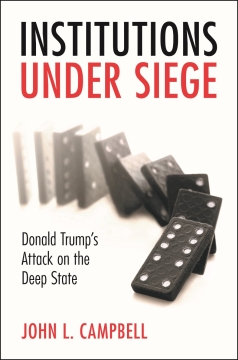
Institutions Under Siege: Donald Trump's Attack on the Deep State (Cambridge University Press, 2023)
John Campbell's research interests span economic and political sociology, comparative political economy, and institutional theory. He has written about energy and tax policy, change in the U.S. economy, transformations of post-communist societies, the rise of neoliberalism, corporate social responsibility, globalization, the role of ideas and experts in policymaking, the 2008 financial crisis, and Donald Trump's rise to power and attack on the "deep state." The thread connecting all this is his interest in how institutions affect national political economies and how they change.
BOOKS:
Campbell, John L. 2025. Pay Up! Conservative Myths About Tax Cuts for the Rich...And Why They're Wrong. New York: Cambridge University Press.
Campbell, John L. 2023. Institutions Under Siege: Donald Trump's Attack on the Deep State. New York: Cambridge University Press.
Campbell, John L. and John A. Hall. 2021. What Capitalism Needs: Forgotten Lessons of Great Economists. New York: Cambridge University Press.
Pay Up! Conservative Myths About Tax Cuts for the Rich...And Why They're Wrong
Since the late 1970s Republicans and other conservatives in the United States have called for lower taxes on the rich and large corporations. They insist that these taxes are too high, stifle the economy, facilitate wasteful government spendng, are unfair to everyone, and undermine freedom in America. These are all myths rooted in neoliberal theory. Based on historical evidence and data from the United States and other advanced capitalist democacies, this book debunks these myths and argues that high and progressive taxes can actually be good for the Unied States. It also explains why these myths refuse to die. Results will appear in Pay Up! Conservative Myths About Tax Cuts for the Rich...And Why They're Wrong (Cambridge University Press, 2025).
Institutions Under Siege: Donald Trump's Attack on the Deep State
As president, except for the Civil War, Donald Trump's attack on America's political institutions was unprecedented in American history. He shredded electoral norms and created the "Big Lie" claiming that the 2020 election was stolen from him. He packed the federal courts with judges and justices he thought would do his bidding. He bullied the Department of Justice to serve his political interests. He tried to politicize the civil service. And by slashing taxes but not spending he added trillions of dollars to the government debt. Most social scientists study how institutions change incrementally. But Trump's attack was an attempt at radical change. It sheds new light on our understanding of how institutions change, the role that leadership and tipping points play in it, and what the implications are for the United States going forward. Results appear in Institutions Under Siege: Donald Trump's Attack on the Deep State (Cambridge University Press, 2023).
What Capitalism Needs: Forgotten Lessons of Great Economists
The stability of capitalism in the postwar era has been slowly destroyed and replaced by the increasingly fragile system of the twenty-first century. Mainstream economists have neglected key underlying social forces that are destabilizing capitalism today. These are the forces of classes, nations and states. This neglect stems, ironically, from contemporary economists overlooking important sociological and political lessons of some of their greatest predecessors, including Adam Smith, Friedrich List, Joseph Schumpeter, John Maynard Keynes, Karl Polanyi, and Albert Hirschman. The project explores these economists' arguments about caplitalist instability, how their insights help explan capitalism's instability today, and what this means for capitalism's prospects in the future. Results appear in What Capitalism Needs: Forgotten Lessons of Great Economists (Cambridge University Press, 2021).
The World of States, second edition
We live in a world of nation-states. We cannot understand this world without appreciating the institutional character of different types of states and the nature of the interactions among them. States are not disappearing due to globalization but they are changing as are their relationships with each other. This book is a revised and updated version of the first edition, published in 2015. A lot has happened in the world since then, including China's continued growth as an economic powerhouse, the election of Donald Trump, Brexit, trade wars, a resurgence in nationalism and populism in many countries and the corona virus pandemic. This second edition takes all of this into account to better understand the world of states. This new and updated analysis appears in The World of States (Cambridge University Press, 2021).
American Discontent: The Rise of Donald Trump and Decline of the Golden Age
How did someone with no political experience and who never ran for public office suddenly become President of the United States? This project answers that question. Donald Trump's rise to power was just the tip of a deep political-economic iceberg involving slowly developing trends since the 1970s in the economy, race relations, ideology and politics that reached a tipping point, and that was suddenly pushed over the edge by the 2008 financial crisis, Barack Obama's election as President, and his moves to manage the crisis and reform the health care system. The project also examines how this compares to populist resurgence in Europe, and how it will change the face of American politics and U.S. hegemony in the future. Results appear in American Discontent: The Rise of Donald Trump and Decline of the Golden Age (Oxford University Press, 2018).